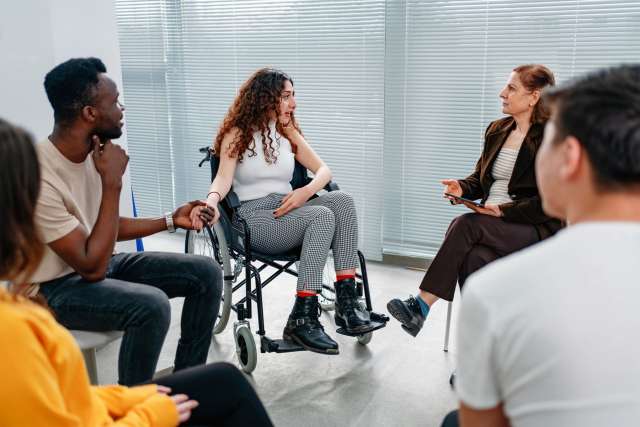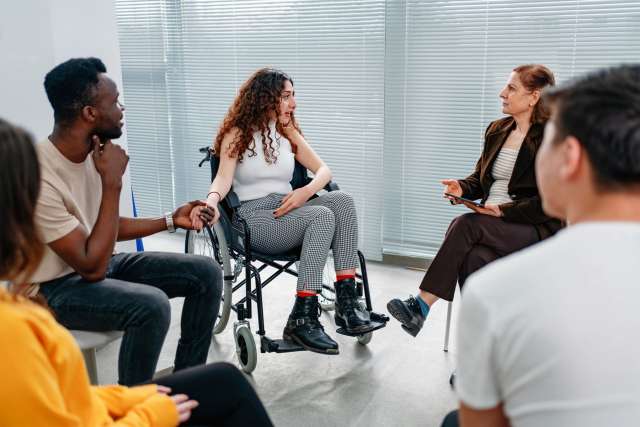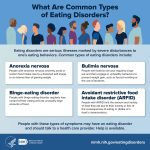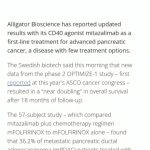

Young Adults Facing Cancer: A Unique Journey at UCLA Health
In today’s healthcare landscape, the conversation around cancer is evolving. Traditional narratives focused on older patients, but a new chapter is unfolding where adolescents and young adults face their own set of tricky parts and tangled issues. At UCLA Health’s Simms/Mann Center for Integrative Oncology, specialized programs have emerged to help this unique group find their way through the many twists and turns of cancer treatment, recovery, and everyday life challenges.
This opinion editorial will share insights on the current state of care for young cancer patients. It examines the challenges they face, highlights the impact of focused counseling and support groups, and offers a thoughtful look at the strengths these individuals bring to their journeys—even when setbacks and recurrences add nerve-racking stress to an already overwhelming situation.
Understanding the Tricky Parts of a Young Cancer Diagnosis
When a young adult is diagnosed with a rare and aggressive form of cancer, like Anaplastic Pleomorphic Xanthoastrocytoma (APXA), the experience is loaded with tense emotional moments, complicated pieces of decision-making, and difficult personal challenges. Young patients often envision a future filled with career growth, family life, and recreational activities, only to have that vision suddenly turned upside down by a life-altering diagnosis.
One patient’s story from the Simms/Mann Center vividly illustrates these tangled issues. Kristin Doss, for example, anticipated a future dedicated to raising children and pursuing career aspirations. Instead, she found herself forced to make nerve-racking decisions about treatment and the future, all while comforting her own young children and managing the daunting physical and emotional impacts of treatment.
Young adults face certain challenges unique to their age group, including:
- Disruptions to educational and career plans.
- The delicate balance between personal identity and the imposed identity of a patient.
- Financial insecurity, as many are only beginning to build their financial independence.
- Difficult conversations about fertility preservation and future planning.
- The added stress of explaining a terminal or recurring condition to young family members.
Although each patient’s journey is unique, these common threads illuminate how a cancer diagnosis for someone in the 15 to 39 age bracket is full of problems that extend far beyond medical details—they impact every fine point of life.
Impact of Specialized Counseling on Adolescent Cancer Patients
One of the revolutionary changes at the Simms/Mann Center is the appointment of a dedicated clinical oncology social worker for patients aged 15 to 39. With the arrival of Carly Nahin, LCSW, the center has taken an essential step towards providing emotional and social support tailored to the needs of younger cancer patients.
Unlike older patients who may already have a well-established support system, younger individuals are in the midst of figuring out their lives. They need someone who understands the small distinctions of their experience—someone who can get into the nitty-gritty of balancing treatment with life’s everyday demands.
In treatment sessions and support groups led by Nahin, patients discuss more than just medical treatments or the intimidating side effects. Their gatherings serve as a space for discussing the little twists and challenging pieces of modern oncology, from managing personal identity during illness to finding ways to maintain a sense of normalcy amidst recurring treatments.
How Counseling Bridges the Gap Between Illness and Everyday Life
Carly Nahin’s work is centered around offering holistic care. Her approach combines practical advice with emotional support, encouraging patients to focus on what they look forward to each week—whether it is a simple family outing or a brief escape from the rigors of treatment. This form of therapy not only addresses the physical toll of cancer, but also digs into the more complicated pieces of mental well-being and personal empowerment.
In private one-on-one sessions, twice monthly, patients like Doss discuss not only their symptoms but also the subtle parts of their worries: the fear of recurrence, the overwhelming burden of being the primary caregiver or partner, and the challenge of maintaining a hopeful perspective even when treatments seem to set them back.
Balancing Health, Family, and an Uncertain Future
For many young patients, especially those with families, the daily struggle becomes one of balancing personal health with family responsibilities. When cancer strikes during what should be the prime years for building a career and a family, every decision becomes laced with additional, often nerve-racking, layers of responsibility.
Kristin Doss’s narrative, while deeply personal, echoes a broader theme: many young adults undergoing cancer treatment wrestle with the burden of worrying not only about themselves but also about the emotional impact on their children and loved ones. Conversations about a future that looks drastically different are off-putting and stressful, yet they are a necessary part of coping and planning.
A Closer Look at Personal and Family Challenges
Some of the challenges faced by younger cancer patients include:
- Communicating a diagnosis to teenage children without overwhelming them.
- Adjusting family roles when the patient is traditionally seen as the caregiver.
- Dealing with the fear of recurrence, especially after exhausting cycles of treatment.
- Aligning a professional path with the unpredictable demands of ongoing medical care.
- Maintaining personal relationships when the patient feels isolated or misunderstood.
Within these bullet points lies a landscape full of subtle details that make every case unique. Whether it’s an anxiety-riddled moment before a follow-up appointment or managing the inner turmoil associated with a health setback, these experiences demonstrate the layered, often tense nature of managing a demanding illness while fulfilling everyday roles.
Online Support Networks and Innovative Support Groups
With digital technology permeating every aspect of modern care, online support networks have become a cornerstone for young patients managing their treatment. Weekly online support groups, as hosted by the Simms/Mann Center, offer more than convenience—they provide a space where patients can connect with peers undergoing similar rough patches.
Participants in these groups find solace in shared experiences. The environment is structured to encourage direct communication and candid conversation that gets into the fine shades of fear, hope, and progress. For many, it’s a platform to make their way through the confusing bits of cancer treatment by simply knowing they are not alone in the struggle.
Benefits of Virtual Support for the Younger Population
To illustrate, here are some key benefits of online support groups for young cancer patients:
- Accessibility: Patients can log in from anywhere, making it easier to access support even when physical mobility is impaired.
- Comfort: The virtual setting often provides a sense of security and reduces the intimidation factor of in-person group meetings.
- Peer Connection: Connecting with peers who share similar experiences helps in sorting out life’s challenging questions, one discussion at a time.
- Real-Time Advice: Immediate, real-world insights from those who have faced similar obstacles can prove invaluable.
- Emotional Validation: Sharing a story and receiving acknowledgment can lift burdens that would otherwise feel isolating.
When patients appreciate each other’s experiences and sincerely thank one another for their support, it creates an atmosphere that can make even the most overwhelming aspects of treatment feel more manageable.
Strengths and Resilience in the Face of Health Challenges
One might instinctively frame a cancer diagnosis in a negative light, but it’s important to spotlight the inherent strengths that many young patients bring to the table. Their openness to discussing every detail of their treatment—including the problematic, confusing bits—and their willingness to push back against feelings of isolation exemplify a resilience that is both moving and inspirational.
For example, despite experiencing memory challenges, word-finding difficulties, and profound physical exhaustion after radiation and chemotherapy, patients like Doss show a remarkable capacity to advocate for themselves in the clinical setting. Their insistence on wanting to know every bit of information “up front” underscores their desire for control—a control that sometimes extends magnificently into life outside the hospital walls.
Nurturing Resilience: The Role of a Proactive Attitude
Resilience is built through small acts that can seem almost trivial in isolation, yet collectively contribute to an overall strategy for coping with illness. Some of these acts include:
- Regular, honest communication with healthcare providers.
- Engaging in counseling sessions that focus on emotional well-being as much as on medical treatment.
- Participating actively in support groups and sharing personal success stories.
- Building routines that honor both treatment schedules and personal hobbies or interests.
- Staying informed about treatment options and potential side effects.
When patients combine these practices, they create a buffer against the nerve-racking challenges of recurring treatments and the off-putting side effects that can appear unexpectedly. Their collective strength is not just in the ability to survive, but in the drive to thrive while their circumstances remain uncertain.
Finding Your Path: The Art of Holistic, Integrative Care
Holistic care in oncology has come into sharp focus at institutions like UCLA Health, where the Simms/Mann Center is known for its integrative approach. Rather than merely targeting the tumor, the center places equal emphasis on the overall well-being of the patient. This kind of care considers mental health, family dynamics, financial concerns, and even the restoration of personal identity during and after treatment.
Integrative oncology is about weaving together medical treatment and comprehensive care practices that address every aspect of a patient’s life. Whether it’s through counseling, nutritional advice, or the inclusion of support groups and financial guidance, the aim is to help patients find their way in a life that has suddenly become full of confusing bits and twists and turns.
Key Elements of Holistic Care at UCLA Health
Here’s a table summarizing the essential aspects of holistic care provided by the Simms/Mann Center:
| Aspect of Care | Description | Benefits |
|---|---|---|
| Emotional Support | Regular counseling sessions and group support focused on the mental and emotional challenges of cancer. | Helps reduce stress and provides tangible coping mechanisms. |
| Medical Expertise | Access to specialists in neuro-oncology, radiation, and chemotherapy standard procedures. | Provides evidence-based treatment options and continuous care. |
| Family Counseling | Assistance in handling the emotional impact on family members, including children. | Strengthens family support and communication in a time of crisis. |
| Nutritional Guidance | Advice on diet adjustments and nutritional enhancements tailored to individual needs. | Aids recovery and supports overall health during treatment. |
| Financial & Logistical Support | Guidance on managing the economic strains of treatment through practical support groups. | Reduces stress by addressing practical concerns, thus allowing focus on recovery. |
This integrative approach is critical in an era where cancer treatment is not just about survival but about maintaining a quality of life in the midst of continual challenges. For young adults, it means having the ability to address every little twist—whether it is figuring a path to financial stability or managing the small distinctions in treatment choices.
Technology, Transparency, and Direct Communication
In an age where people crave transparency and direct communication, younger cancer patients bring a refreshing demand for clear-cut information. They want to be told the entirety of their situation up front—every detail, every potential side effect, and every piece of evidence that might guide their decisions. This expectation for honesty in communication is not just a preference; it is a key component of building trust between patients and providers.
The culture of direct, upfront conversations is evident at simms/mann where both healthcare providers and support staff acknowledge that every small twist of the treatment process matters. Patients are encouraged to ask questions, explore different options, and even challenge conventional advice if it does not fit their unique needs. This mindset allows them to steer through the nerve-racking moments of uncertainty with as much clarity as possible.
The Importance of Clear Communication in Oncology
Some of the benefits of this transparent approach include:
- Empowerment: Patients feel more in control when they have all the details upfront.
- Better Decision Making: Knowing every element of their treatment allows patients to make informed choices about their medical and personal lives.
- Increased Trust: A direct line of communication creates a stronger, more trusting relationship between the healthcare team and the patient.
- Reduced Anxiety: When uncertainties are addressed head-on, patients are less likely to feel overwhelmed by unexpected news.
In a time when data flows quickly and every patient is digitally connected, the expectation for this level of openness also extends into the digital realm—from online support sessions to telemedicine consultations. It is a labor-intensive yet super important task that redefines traditional patient-provider dynamics, ensuring that even the youngest patients receive the most comprehensive care available.
Finding Hope and Community Amid Recurrence and Recovery
It is often said that cancer is a journey full of unexpected turns, and the experience of recurrence only serves to add to the complex pieces of an already laid-out road map. For young patients like Doss, facing a recurrence after a cycle of comprehensive treatment is both intimidating and deeply disheartening. The emotional sting of finishing one round of chemo only to be thrust back into another cycle of surgery, radiation, and therapy is a reality many in this age group know far too well.
Yet, there is a silver lining: within these moments of profound challenge, a strong and supportive community emerges. The support groups at Simms/Mann have become a touchstone for patients experiencing recurrence—providing reassurance, practical advice, and the kind of soulful understanding that only comes from shared experiences.
Key Strategies for Managing Recurrence in Young Adults
Managing recurrence involves several practical strategies:
- Continuous Communication: Keeping an open dialogue with healthcare providers helps in quickly addressing any signs of relapse.
- Revisiting Treatment Goals: Regularly updating treatment plans to closely match the patient’s evolving health status.
- Emotional Counseling: Continued support from mental health professionals to deal with the recurring nature of the disease.
- Community Support: Engaging with patient groups that offer shared experiences and emotional validation.
These approaches, when integrated with a holistic plan, can help young patients find hope even at times when the outlook seems unbearably bleak. They remind us that every nerve-racking, overwhelming day is counterbalanced by moments of connection, understanding, and, importantly, personal strength.
Professional Reflections: Lessons from the Frontlines of Integrative Oncology
Healthcare professionals at the Simms/Mann Center have made several key observations from their work with young adult patients. Their insights can serve as guiding stars for broader discussions about the future of cancer care among younger populations. Some of these lessons include:
- The importance of a tailored approach that recognizes that the fine points of each patient’s life are as critical as the medical data.
- The value of early, honest conversations about difficult topics—such as recurrence and treatment side effects—to ensure patients feel empowered.
- The need for a seamless integration of psychosocial support, where mental and emotional health are given just as much time as clinical treatments.
- The benefits of creating spaces where patients can share experiences in a candid, supportive environment without fear of judgment.
- The realization that technology, especially online support platforms, can bridge gaps that physical barriers often create.
These insights derive not only from clinical experience but also from the personal stories of patients who have chosen to be open about their journeys. Each shared experience serves as a reminder that even when the road ahead is full of confusing bits and nerve-racking detours, a well-organized support network can make a meaningful difference.
Looking Ahead: The Future of Care for Young Cancer Patients
As the medical community continues to figure a path through the intricate landscape of oncology, there is hope that the lessons learned today will drive tomorrow’s advancements in patient-centered care, especially for younger demographics. The integration of specialized counseling, online support groups, and a solid emphasis on holistic care promises not only to treat the disease but also to mend the many little pieces that make up a vibrant life.
Key areas that could shape the future of care include:
- Personalized Treatment Plans: Leveraging genetic data and patient history to tailor treatments that address the unique, subtle parts of a patient’s condition.
- Enhanced Support Services: Expanding programs that specifically address the twists and turns faced by young adults in the midst of cancer treatment.
- Digital Integration: Further development of telemedicine and digital support groups to ensure patients can access timely care and transparent communication regardless of location.
- Financial and Logistical Aid: Increasing resources that help mitigate the economic pressures unique to this age group, allowing them to focus on recovery and quality of life.
- Research and Education: Building better educational programs that not only inform patients about treatment options but also prepare them for negotiating the nerve-racking shifts in their clinical journey.
The importance of these advancements cannot be overstated. As we take a closer look at the current state of integrative oncology, it becomes clear that every new initiative is aimed at ensuring that the journey—even when interrupted by setbacks or recurrences—is smoother, more supportive, and ultimately, more hopeful for young adults.
Community, Empowerment, and the Road Forward
In conclusion, the evolving role of integrative care for young cancer patients is transforming how we think about treatment and recovery. At the Simms/Mann Center, the combination of professional guidance, precise communication, and a warm online community creates an environment where even the most overwhelming aspects of cancer can be mitigated by shared strength and understanding.
It is essential for society to recognize that while the road may be full of confusing bits and intimidating twists, the collective efforts of clinical professionals and peer support networks are a testament to human resilience. By taking a proactive stance—whether through embracing transparent conversations or actively participating in support groups—patients are empowered to face the challenges head-on, developing a balanced perspective that encompasses both the trials of treatment and the promise of tomorrow.
As we watch this innovative model of care unfold, we are reminded that every contribution, every shared experience, and every story of personal triumph plays a critical role in shaping a future where young adults not only survive cancer but also find meaning and empowerment in the process. The journey is riddled with tension and nerve-racking moments; yet, the sense of community built among patients creates a network of strength that is nothing short of inspirational.
Our collective hope is that more healthcare facilities will adopt a similar holistic, integrative approach, ensuring that no young person ever feels isolated in their battle against cancer. Only by addressing every fine point—from direct communication and counseling to financial and family support—can we truly honor the courage of those who are fighting, every day, against overwhelming odds.
Final Thoughts: A Call for Continued Innovation in Cancer Care
In reflecting on the notable advancements at UCLA Health’s Simms/Mann Center, we are encouraged to continue pushing the envelope of what cancer care can be. It is not just about treating an illness, but about nurturing every small distinction of a person’s life that has been impacted by it. This journey, while filled with daunting challenges and nerve-racking recurrences, exemplifies a broader commitment to caring for the whole person.
Young adults deserve a care strategy that is as comprehensive as it is compassionate—one that understands that every twist and every complicated piece of their experience matters. Through continued research, collaboration, and unwavering support, the future of oncology can and should be a model of integrative compassion, innovative dialogue, and unwavering patient empowerment.
As we move forward, let us celebrate not only the scientific and medical achievements made in the fight against cancer, but also the human spirit—a spirit that refuses to be defined solely by the disease, and instead rises above the intimidating challenges to ignite hope and cultivate resilience in the hearts of those who need it most.
The journey ahead is long and scattered with countless nerve-racking turns, but with each step, every shared story, and every heartfelt conversation, we are making progress. And it is in this progress that the true essence of integrative and compassionate care is found.
Let us champion a future where every young adult diagnosed with cancer can look forward to not only surviving but also thriving in a community that understands and supports every little twist of their life. Together, we can find a path forward that honors both the medical and the personal elements of this challenging, yet hopeful, journey.
Originally Post From https://www.uclahealth.org/news/article/support-young-generation-patients-with-cancer
Read more about this topic at
Empowering Young Lives | Every Child Deserves a Chance
Empowering YOUNG Lives | Park Forest IL


